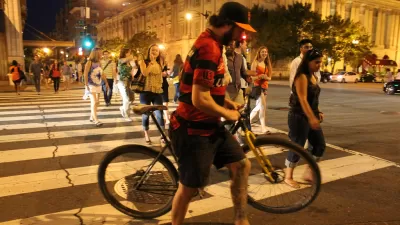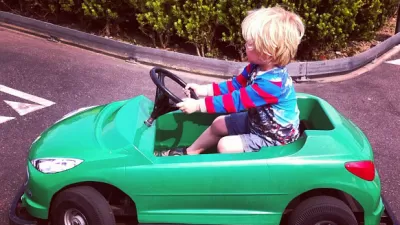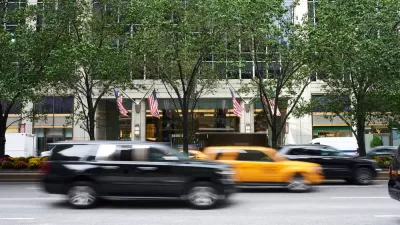Millennials are less likely to get driver's licenses, they tend to take fewer, shorter car trips, and they use alternative modes of transportation more than their predecessors. The question for the ages is why.

Emily Badger follows up on the growing body of evidence that Millennials are driving less to ask why that is. For instance: "Are millennial driving habits a byproduct of the weak economy? (If you have no job to go to, chances are you drive less.) Or do they signal deep and permanent shifts in the American relationship to automobiles?"
These questions are the subject of a report by U.S. Public Interest Research Group and the Frontier Group released on October 14, 2014, titled "Millennials in Motion: Changing Travel Habits of Young Americans and the Implications for Public Policy."
After acknowledging that these questions won't be answered for at least several years, Badger explains that the report finds that "the case is growing stronger for a major and lasting change in how today's youngest would-be drivers — and those to follow them — use cars." Moreover, the study argues that "it's time to rethink how we subsidize, encourage and invest in car use."
The article goes on to break down the technology argument (i.e., "maybe they simply chose not to [to drive], precisely because they now have more and better alternatives"), the economy argument (i.e., "long-term socioeonomic shifts underway that will likely continue to affect car use even after the economy fully recovers")., and the cultural argument (i.e., "the underlying cultural preferences of millennials are changing).
FULL STORY: The many reasons millennials are shunning cars

Planetizen Federal Action Tracker
A weekly monitor of how Trump’s orders and actions are impacting planners and planning in America.

Restaurant Patios Were a Pandemic Win — Why Were They so Hard to Keep?
Social distancing requirements and changes in travel patterns prompted cities to pilot new uses for street and sidewalk space. Then it got complicated.

Map: Where Senate Republicans Want to Sell Your Public Lands
For public land advocates, the Senate Republicans’ proposal to sell millions of acres of public land in the West is “the biggest fight of their careers.”

Maui's Vacation Rental Debate Turns Ugly
Verbal attacks, misinformation campaigns and fistfights plague a high-stakes debate to convert thousands of vacation rentals into long-term housing.

San Francisco Suspends Traffic Calming Amidst Record Deaths
Citing “a challenging fiscal landscape,” the city will cease the program on the heels of 42 traffic deaths, including 24 pedestrians.

California Homeless Arrests, Citations Spike After Ruling
An investigation reveals that anti-homeless actions increased up to 500% after Grants Pass v. Johnson — even in cities claiming no policy change.
Urban Design for Planners 1: Software Tools
This six-course series explores essential urban design concepts using open source software and equips planners with the tools they need to participate fully in the urban design process.
Planning for Universal Design
Learn the tools for implementing Universal Design in planning regulations.
Heyer Gruel & Associates PA
JM Goldson LLC
Custer County Colorado
City of Camden Redevelopment Agency
City of Astoria
Transportation Research & Education Center (TREC) at Portland State University
Camden Redevelopment Agency
City of Claremont
Municipality of Princeton (NJ)




























